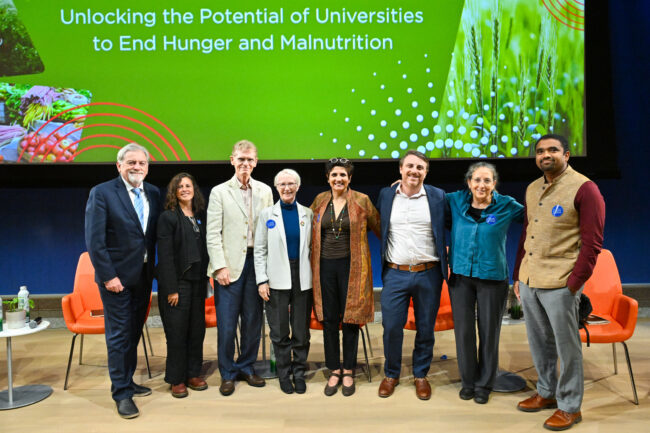
Can powerful institutions like universities address seemingly intractable issues like global hunger? How can they get critical research into the hands of policymakers? And how can we co-create solutions with communities that are the most impacted by climate change?
These questions were front and center last Saturday at Food for Humanity: Unlocking the Potential of Universities to End Hunger and Malnutrition, the first of Columbia Climate School’s events as part of New York City’s Climate Week.
The event opened with the year’s first World Leaders Forum, followed by three panels discussing issues around poverty, food equity and the role of research. They featured a wide range of Columbia Climate School affiliates, including Jeffrey Shaman, interim dean of the Climate School; Jessica Fanzo, professor of climate at the Climate School and director of the Food for Humanity Initiative; Ruth DeFries, co-founding dean emerita at the Climate School; and Cynthia Rosenzweig, senior research scientist at Climate School’s NASA Goddard Institute for Space Studies.
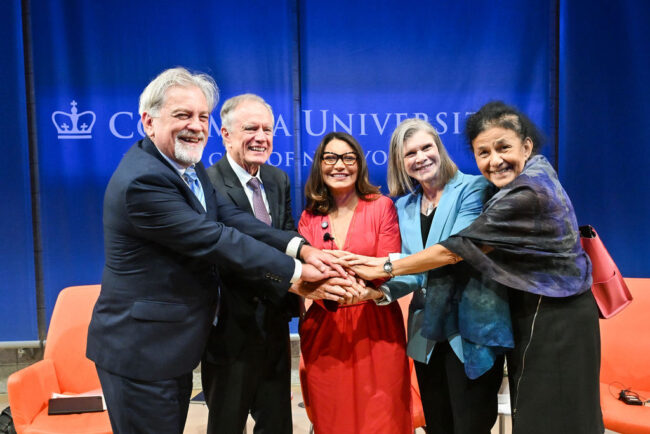
To follow are participant quotes that highlight major themes of the conference.
A snapshot of the crisis
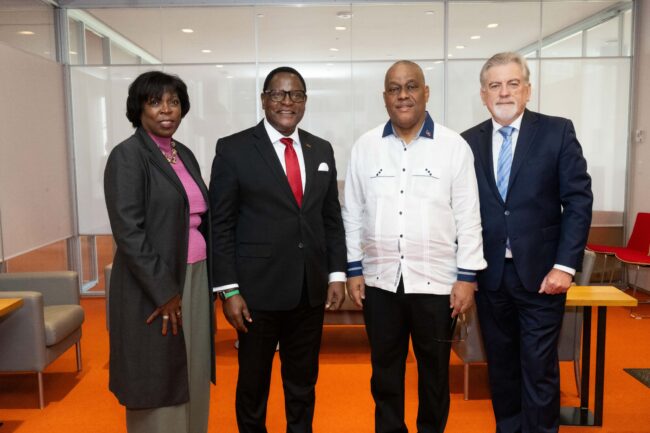
Lazarus Chakwera, president of Malawi: “There is acute food insecurity in Malawi [abetted by] El Niño and Cyclone Freddy. Every year since I became president four years ago, I’ve had to declare a state of natural disaster.”
Garry Conille, prime minister of Haiti: “Almost half of the population in Haiti is food insecure, and two million are in a state of emergency. Millions of children are malnourished. And all this is 45 minutes from the richest country in the world.”
Ambassador Ertharin Cousin, CEO and founder, Food Systems for the Future: “We don’t have data granularity for food systems. Universities [have historically been] for scholarship, not for supporting program design or outcomes of investments.”
Rosângela da Silva, first lady of Brazil: “Over 700 million people are starving in the world, and 2.3 billion are experiencing food insecurity. In 2023, 33 million Brazilians were starving.”
Wafaa El-Sadr, founder and global director of ICAP at Columbia: “We must look at the social determinants [of health]. People are looking for a silver bullet. There is no silver bullet. Life is much more complicated than that.”
Purnima Menon, senior director, food and nutrition policy at the International Food Policy Research Institute: “Childhood stunting in India [due to malnutrition] is still standing. It took 45 years for it to be recognized, [for stakeholders to] agree on the problem.”
Afshan Khan, assistant secretary-general of the United Nations and coordinator of the Scaling Up Nutrition (SUN) movement: “Covid and climate change has moved malnutrition down the list of global priorities.”
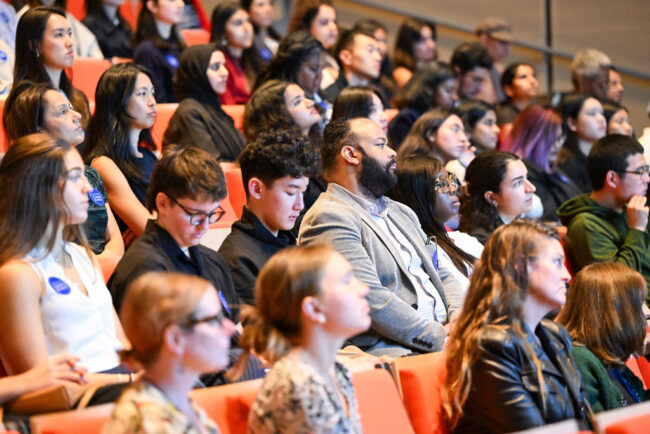
The role of women in global politics
Rosângela da Silva: “We need more women in politics, more women in government and leadership, in particular women from the global south…. Brazil is close to the last position in the world regarding the number women in parliament. A strong state will help address inequality, build solidarity.”
Angela Olinto, provost of Columbia University: “Women are integral to the future of the planet.”
Jemimah Njuki, chief of the economic empowerment section at UN Women: “Every year we do a gender snapshot of where the world is on gender equality. Right now, we only have 40 countries reporting on this. One of our programs is Women Count, which includes gender stats, time-use data. We don’t have a lot of countries collecting desegregated data.”
How universities and research can play a role in addressing malnutrition and food security
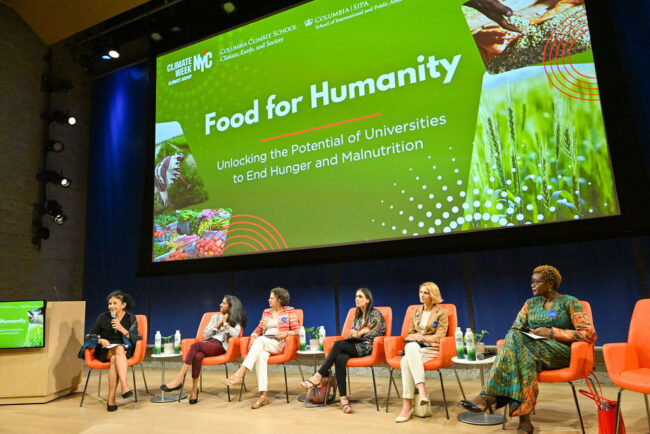
Ambassador Ertharin Cousin: “We don’t have data granularity for food systems. Universities [have traditionally been] for scholarship, not for supporting program design or outcomes of investments. We need a proven community of actors with data to support policies to drive the financing that we need. Change is at the nexus between policy and finance.”
Ana Maria Loboguerrero, director, adaptive and equitable food systems at Bill and Melinda Gates Foundation: “As scientists, we are so passionate about our research—we think everyone understands what we say. But we must think about the role of research. There is a call for universities and research institutions to fill the gap in food data. But the issue is so complex, we can’t stop there. We must fill information gaps and also package this data so to persuade. You can’t persuade policy makers by making a graph.”
Purnima Menon: “Researchers can play a critical role in connecting the dots between data, evidence and policy. We [all] agree that healthy diets are the goal, but we are not fully there on drivers or solutions. It’s a very big agenda, and we must embrace its complexity and do excellent research.”
Jemimah Njuki: “We need to make stronger connections between research and the policy space. Not just the packaging of the research but what is important about the research.We need to ask, what kind of research is going to push the policy and programmatic agenda?”
Dhanush Dinesh, founder of Clim-Eat: “We need to change incentives within universities so to incentivize people [to connect science and policy], instead of people going above and beyond their job descriptions [to do so].”
Opportunity crops and other potential solutions
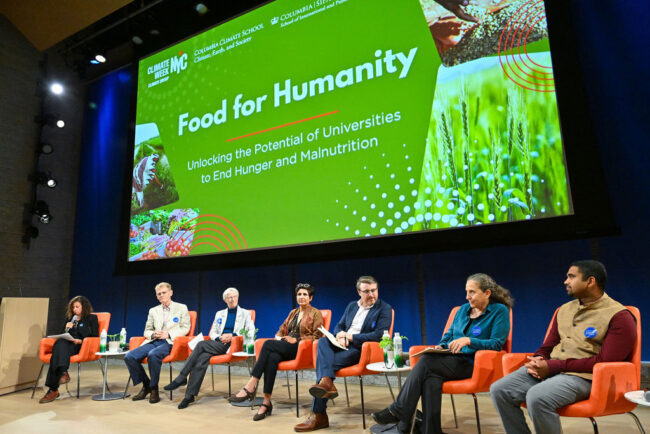
Cynthia Rosenzweig: “Opportunity crops are more climate-resilient.”
Ruth DeFries: “We’ve lost a lot of diversity, of locally adapted crops. Diversity is critical, critical, critical. That gets us to the opportunity crops. [For example], millets have been fundamental throughout the history of humanity. The government in India has recognized the importance of millet—it’s very high on the policy agenda. Yet millet is very expensive in urban areas. How do we match that high level of policy attention to what is happening on the ground? There you see the mismatch. My work is very much on the ground and very local. We must partner with the very grassroots NGOs. The NGOs cannot do this alone.”
Ambassador Ertharin Cousin: “We need university science to develop seeds. The private sector has patents on seeds.”
Cary Fowler, “father” of the Svalbard Global Seed Vault: “Governments are short-term thinkers. We need a vision for adaptive crops and soils, for crops that are adapted to climate change. Nutrition has to be at the center of everything.”
The importance of listening to community and youth
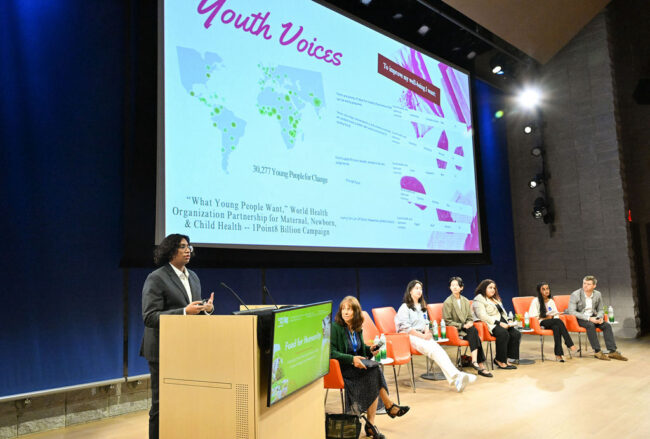
Ana Maria Loboguerrero: “Models help us understand complexity. Once you have the results, then must test the results. Then go back to your assumptions—go back to your community and test those results and see what happens….We must work on the co-generation of knowledge.”
Ruth DeFries: “Success is when evidence gets used for some kind of decision for someone outside of our academic sphere…. You can’t just go in, from the global north. It took me a good 10 to 15 years to show up, listen, learn, try to see where I might be helpful.”
Rehman Hassan, World Health Organization adolescent champion and youth representative: “We must focus on intersectoral action, and youth must be involved. Because we are the people who are going to be living in the world we create.”




No Comments
Leave a comment Cancel